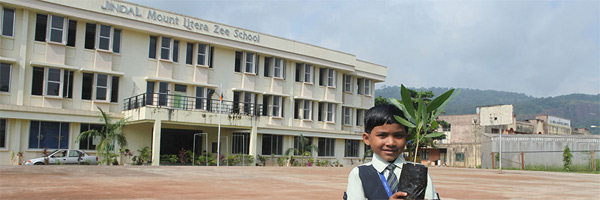
Our Sustainability Policy
Do more with less!
A story about one of India’s business legends, Shri G.D. Birla, goes thus: Taking around on the shop floor, Shri Birla tells his foreman, “There is an eight anna piece lying on the floor, please pick it up.” The perplexed foreman is unable to spot the coin, upon which Birlaji shows him a bolt lying on the shop floor. D.P. Jindal mentions this story very fondly, as it consistently inspired him to always look at unused material not as waste but as a resource. That’s why the heat from the our plant fuels the factory canteen’s boilers and helps them cook the meals. That is why the pinewood crates, the packaging in which the original plant arrived from the US, today form a magnificent pinewood ceiling in the Director’s bungalow at Nagothane. Another example: Rocky boulders that were dug out of the foundation area were broken down, crushed and reused in construction. Further, since sand was locally unavailable and therefore expensive to procure, Sh. B.C. Jindal decided to test grit from the crusher material in the lab as a possible substitute for sand. The lab report was positive and after that this ingenious solution was adopted. Since the quantity of grit produced was not enough, the grit from all local construction sites was bought up and used!
Conserving resources is a virtue!
Being thrifty, a deeply ingrained Indian value, takes pride of place at our. Waste is a bad word. Holding auctions every month to dispose off the scrap is another pioneering effort by our. It is difficult to imagine that such a common sense procedure did not exist till it was instituted by our and other companies soon followed suit. Further, in all our offices, using both sides of a paper sheet is mandatory and no waste is condoned. It is the same for all natural resources too. our pioneered rain-water harvesting in Nagothane, an area where water is scarce. During the monsoon, our uses rainwater in its plant and it has built a storage capacity of 10-15 day use. In fact the company teaches these same principles of water conservation to the residents of the surrounding villages and helps them harvest rainwater. This ensures that using natural resources wisely and practicing modern methods of conservation is a learning that percolates into every level of society.
Recycle and reuse!
Around the same time that the factory was being constructed at Nagothane in 1989, the construction of the Kolkata metro was almost over and there were quite a few I-beams left unused. These were subsequently auctioned and Sh. B.C. Jindal bought these I-beams at half the cost, to be used in the construction of the 7” Seamless Pipe plant. This astute purchase saved the company a fair amount of money as these I-beams had been specially imported for the metro from Japan and were heavy grade beams of very good quality. At that time, steel was at Rs. 15,000 per ton and our procured them for approximately Rs.7,500 per ton. Cost-consciousness is a constant battle and implementing cost-effective solutions in every sphere of activity is key to the group’s ability to keep delivering on the bottom line.
Care and concern for every member!
Taking care of the immediate our family comes naturally to the company. Group insurance was undertaken so that each employee has protection; in addition, a well-equipped hospital – the B.C. Jindal Charitable Hospital has been set up to provide quality health care to employees. Further, a subsidised CBSE school has been set up to provide quality education in an area that is comparatively remote and backward in this respect. This school - Jindal Mount Litera Zee School – is the first school in the area to have e-boards and online teaching integrated into the normal curriculum, allowing it to maintain excellent educational standards. Comfortable housing is provided within the our compound, and a township has evolved, providing all facilities to residents. The our employees and their families form a vibrant community and are actively involved in celebrating festivals and organizing cultural events that allow them to not only showcase their talent but also create a sense of kinship and belonging.
Serving an extended family!
The our family feeling extends to the residents of nearby villages, too. The local village school is supported by our and the B.C. Jindal Charitable Hospital is open to local residents as well. The company helps them build their houses, provides sanitation facilities and educates them in optimization of water usage through harvesting rainwater and other techniques. Besides this, help is also extended to neighbouring villages during disasters and other calamities. In 1989, when the plant was in the process of being erected, Nagothane experienced the worst flood of the century. The nearby villages being in a low lying area were submerged, so our invited the villagers to take shelter under the huge shed lying constructed but still unused and also conducted a community kitchen for them till it was safe to return to their homes.
The villagers are also encouraged to undergo vocational training and often receive employment in the ancillary industries set up around our. The villagers, too, show their appreciation by treating our and its employees as locals and one of their own. “They are part of our village and like an elder brother who helps us in every thing,” says one of the village elders. Further, the B.C. Jindal Charitable Hospital facilities are open for local residents too. The subsidised CBSE school - Jindal Mount Litera Zee School - set up to provide quality education in an area that is comparatively remote and backward in this respect takes in local residents as well as employee children.


